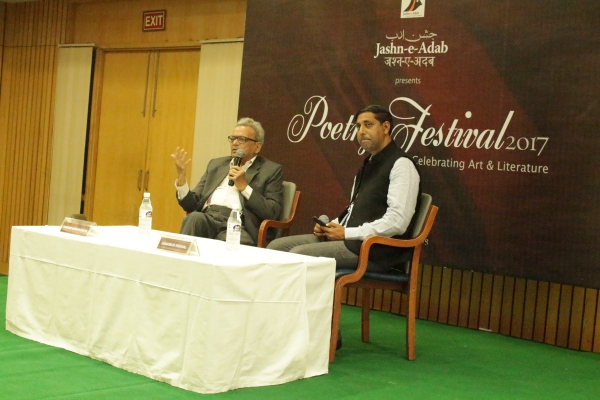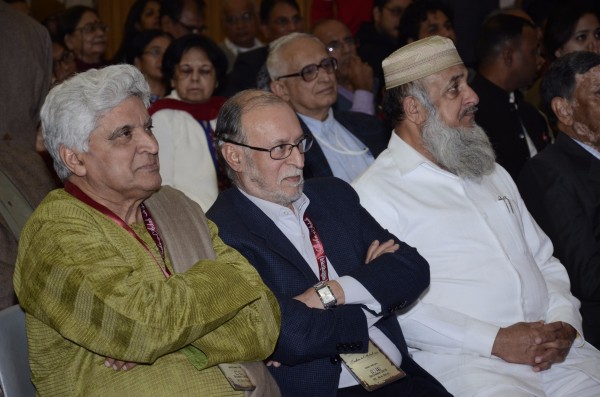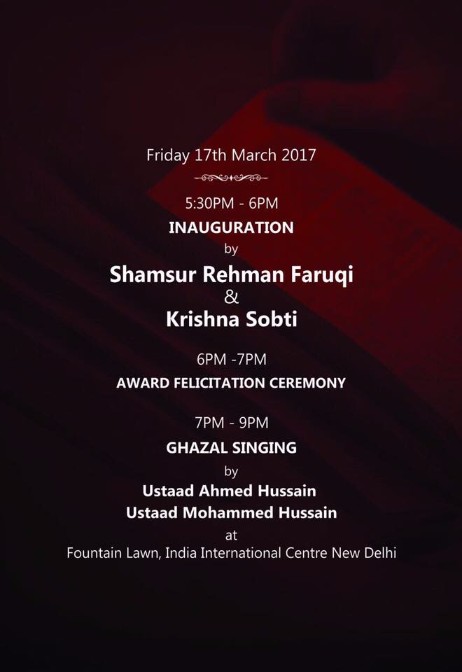Shamim Hanafi, Athar Farooqui and Rattan Lal Hangloo in conversation with Raza Haider
With a panel of prominent writer’s on the dais, the stage contemplated upon Bahadur Shah Zafar’s vision of Delhi; an era of a culture gone astray in the realm of modernity. Mr. Raza Haider initiated the discussion by talking about Delhi’s cultural significance.
‘Yeh wo Dilli hai jo kamyabi aur nakaami ki dastaan apne andar samaitey hai.’
Eminent Urdu writer Athar Farooqi expressed his sadness on the disintegration of Indian culture after the 1947 partition. Stating that Mughal rulers didn’t interfere with the then existing culture of India, he articulated that Mughals merged their own culture with the Indian culture. Several Mughal rulers married within the Hindu fraternity, thereby preserving the essence of Hindustani culture.
Distinguished Urdu litterateur and critic Shamim Hanfi Sahib asserted that although the Mughal reign was followed by a colonial rule, Bahadur Shah Zafar’s Dilli was an epitome of Ganga-Jamuni tehzeeb.
‘Dilli mein ek khoobsurti thi, aur angrezon key liye bhi ek misaal thi,’ he stated. Delhi had embraced a heterogeneous culture, and people moved to Delhi in search of a permanent settlement.
Mr. Ratan Laal Hangloo voiced his opinion by stating that communal tension never prevailed before the Indian partition. Asking the audience to celebrate the ‘Hindustani tehzeeb’ laid during the Mughal reign, Mr. Hangloo urged people to maintain harmony. Reminiscing the past, he also stated that different religions have always lived in peace, and should thereby continue to do so.
Athar Farooqi Sahib added that Delhi’s culture was resplendent and prosperous, and one could revisit the rise and downfall of its culture through poet Mirza Ghalib’s letters written during those times. Referring to Ghalib’s letters written to Munshi Hargopal Tufta and other friends, he stated that Delhi resided in Ghalib’s heart, and hence he could visualize it like nobody else.
Culminating the discussion on a constructive note, Shamim Sahib asked people to keep the Hindustani culture alive by memorializing the past and amalgamating it with the present.
‘Tehzeeb ko samaetiye nahi, phailaiye, aur shehr mein jo bacha hua hai, ussey sambhaal key rakhiye.’
Referring to Ahmed Ali’s novel ‘Twilight in Delhi’, he stated that Delhi still encompasses a nucleus of culture, and it can still be celebrated, only if Indians remember to honor and respect its cultural hybridity.









